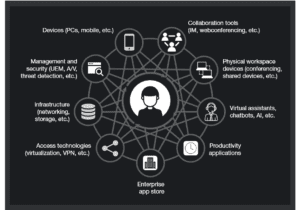Twitter Feed
SourceConnecte! Marketplace With A Mission
Earlier this year, GC GlobalNet launched a new breed of B2B e-commerce sites. Curated by Kevin L. Jackson, SourceConnecte (with an “eâ€) went live with three strategic goals in mind: Efficiently leverage modern…
Potential vs. Reality: Is Edge Computing Real?
Edge computing provides compute, storage, and networking resources close to devices generating traffic. Its benefits are based on an ability to provide new services capable of meeting stringent operational requirements…
Enabling Digital Transformation
Digital transformation integrates technology into all areas of an organization’s business or mission. Its fundamental purpose is to create and deliver innovative and industry-changing products and services to a global…
The ThinkShield Story Part 1: The Challenge
The cybersecurity challenge seems to be growing daily. Threats are becoming more sophisticated, and attacks are becoming more destructive while the corporate world’s response seems to resemble a deer…
CIO dream team: Who’s in and why?
Today’s CIO navigates the twin challenges of enabling new business models and managing rapid technological change. Cloud computing strategies are now table stakes. CIOs must make complex decisions about using…
Digital Transformation and the Mainframe
Digital transformation infuses digital technology into all areas of an organization’s business or mission. Its fundamental purpose is to create and deliver innovative and industry-changing digital products and services to…
Composable Architecture Q&A. Are you ready?
Q: Is it time for my company to jump on the composable architecture bandwagon? A: Composable architectures are quickly becoming essential to the modern enterprise. Citing a recent Forrester study:…
Increase Productivity by Reducing Technology Distraction: Lessons from Forrester Research
Workplace productivity is hurt every day by the very technology developed and purchased to improve it. Forrester announced this surprising conclusion in their latest “How To Wake Up From The Nightmare…
Unveiling the end-to-end capabilities for the networked society
An Interview with Henrik Basilier By Kevin L. Jackson The telecom industry is rapidly moving towards a future in which networks must have the capabilities of delivering services with the…
AT&T Finance Solutions GM on Shrimping, Software, and CX
Helping clients address the trends and challenges presented by the Financial Services industry is the main focus for René Dufrene in his role as General Manager of Finance Solutions at…
The revolutionary business aspects of cloud excite me every day, but the business diversity is even more exciting. This fact really struck me after teaching my last Learning Tree Cloud Computing Introduction class in New York City. I’ve been in the regular rotation here for four months now and have taught three classes during that time. The chart below breaks out the students in these classes by industry.
The heavy US Government slant can of course be attributed to my northern Virginia residency, but the Federal Government has indeed taken on cloud in a big way and the educational focus I’ve experienced from them is commendable. The number of other industries seeking cloud knowledge is also enlightening. As I’ve said many times before, cloud computing is not about technology. It represents a business revolution that is now being universally embraced. In spite of the industry diversity, however, student experiences that drive them to my class and the questions they ask are very similar.
Their stories mostly involve declarations from senior executives or business managers about the imperative to adopt cloud. Marching orders directing an expeditious transformation are then promulgated with little or no understanding of what the undertaking involves. Senior IT managers then show up in the Intro to cloud class asking:
- Is cloud secure?
- Which cloud is best?
- How much will this cost?
- What do I need to do to make this happen now?
The recent Dell sponsored Global Technology Adoption Index (GTAI) survey actually supports my anecdotal observations. This survey of more than 2,000 global organizations found that security is the biggest concern in adopting cloud. Even with this concern voiced, 97 percent of organizations surveyed use or plan to use cloud. This so called cloud computing security “barrier” was expressed by 52% of the survey population. What kind of concern is this!!
While security concerns are supposedly holding organizations back from investing in cloud, a lack of readily available security information is similarly preventing organizations from being prepared during a security breach. Only 30 percent of respondents said they have the right information available to make risk-based decisions, and only one in four organizations surveyed actually has a plan in place for all types of security breaches.
The Dell GTAI findings also overwhelmingly confirms that we are in the cloud era. They show a strong correlation between cloud use and company growth. Of those using cloud, 72 percent of organizations surveyed experienced 6 percent growth or more in the last three years, with just 4 percent experiencing zero or negative growth. This is in sharp contrast with companies not using cloud, where just 24 percent have growth rates of 6 percent or more, and 37 percent experienced either zero or negative growth. The business benefits of cloud computing are even more prevalent when organizations use more than one type of cloud solution. For example, organizations using three or more types of cloud solutions experienced a 15 percent increase in employee productivity relative to those using only one type of cloud solution.
Despite cloud usage rates and the benefits stated above, there are notable challenges facing cloud computing adoption and implementation, most of which stem from a lack of understanding and experience as well as security concerns. Organizations rely heavily on third parties for information about cloud, with 58 percent of those surveyed turning to an IT partner and 45 percent using vendor websites for information. Organizations’ limited experience with cloud computing was one of the top three reasons (33 percent) why they haven’t yet implemented cloud. Security, as previously stated, was the top concern at 52 percent.
So all this data basically confirms what I’ve seen in my classroom. A transition to cloud is inevitable for all industry verticals so don’t fight the feeling! In fact, Learning Tree actually provides an entire Cloud Computing Curriculum to help.
See you in class soon!!!
( This content is being syndicated through multiple channels. The opinions expressed are solely those of the author and do not represent the views of GovCloud Network, GovCloud Network Partners or any other corporation or organization.)
( Thank you. If you enjoyed this article, get free updates by email or RSS – © Copyright Kevin L. Jackson 2012)
Cloud Computing
- CPUcoin Expands CPU/GPU Power Sharing with Cudo Ventures Enterprise Network Partnership
- CPUcoin Expands CPU/GPU Power Sharing with Cudo Ventures Enterprise Network Partnership
- Route1 Announces Q2 2019 Financial Results
- CPUcoin Expands CPU/GPU Power Sharing with Cudo Ventures Enterprise Network Partnership
- ChannelAdvisor to Present at the D.A. Davidson 18th Annual Technology Conference
Cybersecurity
- Route1 Announces Q2 2019 Financial Results
- FIRST US BANCSHARES, INC. DECLARES CASH DIVIDEND
- Business Continuity Management Planning Solution Market is Expected to Grow ~ US$ 1.6 Bn by the end of 2029 - PMR
- Atos delivers Quantum-Learning-as-a-Service to Xofia to enable artificial intelligence solutions
- New Ares IoT Botnet discovered on Android OS based Set-Top Boxes












